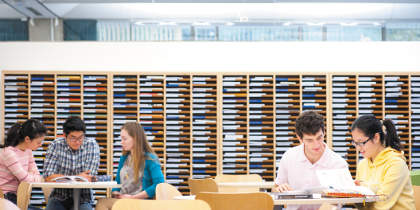
September 12, 2006, by Teaching at Nottingham
An approach to understanding and developing undergraduate students’ research strategies
Mark Bradley, Christian Haase, Helen Hill, Katharina Lorenz, Violeta Sotirova and Lloyd Weeks: “Scholarship at university incorporates a number of practices different from the study techniques students develop to succeed at school. A key aim of this cross-disciplinary project is to understand and develop academic learning and critical thinking among our students, and to explore ways of integrating academic research skills into undergraduate teaching. Studies of research strategies often neglect to consider the expectations undergraduates bring to their studies, and the strategies by which they are encouraged to progress from being passive recipients to independent thinkers are often poorly defined. The main objectives of this project were to explore current undergraduate thinking about their own research strategies and to help HE academics identify issues pertaining to this crucial aspect of university education.
“A SET-SEM style questionnaire with 20 questions was developed that addressed issues such as where students begin their research, their use of individual resources (textbooks, internet, etc.), how they evaluate the reliability of a resource, and their understanding of plagiarism. Quantifiable questions were complemented by open-ended questions. The anonymous questionnaire method was chosen to encourage honest responses. Questionnaires were distributed among five cohorts of undergraduates (Year 1, 2 and 3) each taught by a different group member covering a range of disciplines (History, Classics, English, Archaeology). Some cohorts completed an adapted questionnaire after receiving guidance and completing coursework to see how their research strategies had changed (post-feedback data). The Learning and Teaching Development Fund granted an award for processing the raw data and the group consulted the University of Nottingham Survey Unit for advice.
“329 questionnaires were returned. The data exposed many notable patterns in students’ research strategies, including:
- at the end of Semester 1, 48% of students still wanted more classes on essay-writing and research
- The majority of Year 2 students began research with material in module reading lists (a considerable rise from Year 1)
- post-feedback data shows that Year 1 and 2 students made more use of the internet than they initially expected, and less use of academic journals; they also regarded the internet as a more reliable resource
- developments could be seen from Year 1 to 3 regarding the resources most frequently used and highly valued by students (e.g. academic journals were regarded as a reliable resource primarily by Year 3).
“The project challenged this group to identify key issues to be addressed when teaching research strategies. They include: 1) students’ attitudes towards the internet; 2) students’ awareness of the value of academic journals from Year 1 onwards; 3) directing students’ focus away from introductory textbooks and developing their own analytical skills.
“The implications of the project for future practice are twofold: 1) targeted training and feedback sessions are essential to enhance research skills, and need to be integrated into our disciplines’ courses; 2) future research in this area should monitor the progression of individual students throughout their course in order to better understand developing approaches to research.”
This Paper presented at the University’s Ninth Learning & Teaching conference (September, 2006).
| Prof Mark Bradley Associate Professor of Ancient History School of Humanities |
Dr Christian Haase Lecturer in Modern German History School of History |
| Helen Hill School of Nursing, Midwifery & Physiotherapy |
Prof Katharina Lorenz Associate Professor in Classical Studies School of Humanities |
| Dr Violeta Sotirova Lecturer in Stylistics School of English |
Prof Lloyd Weeks Head of Department of Archaeology School of Humanities |
This article was originally published as part of PESL’s Teaching at Nottingham collection.
No comments yet, fill out a comment to be the first

Leave a Reply